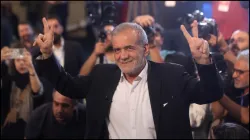'Iran will not respond to US pressure': President-elect Masoud Pezeshkian praises China, Russia
Pezeshkian, 69, has pledged to promote a pragmatic foreign policy and soothe tensions with the West over the scrapped 2015 nuclear pact. In his latest comments, he also showered praises on Russia and China and said Iran will not be influenced by US pressure.

Tehran: Iran's President-elect Masoud Pezeshkian on Saturday asserted that the United States should realise that Iran will not respond to pressure, amid the fractured relationship between Washington and Tehran, and highlighted his country's friendship with China and Russia. The moderate candidate, who defeated a hardline rival in the recent presidential election, also reiterated that Iran does not seek nuclear weapons and promised to expand ties with neighbours.
Pezeshkian, a 69-year-old heart surgeon, has pledged to promote a pragmatic foreign policy, ease tensions over now-stalled negotiations with major powers to revive a 2015 nuclear pact and improve prospects for social liberalisation and political pluralism. In his statement titled "My message to the new world", the President-elect promised to engage with Europe as part of his foreign policy.
"The United States...needs to recognise the reality and understand, once and for all, that Iran does not - and will not - respond to pressure (and) that Iran’s defence doctrine does not include nuclear weapons," he said. "China and Russia have consistently stood by us during challenging times. We deeply value this friendship."
He further called Russia a "valued strategic ally and neighbour" to Iran and said his administration will remain committed to expanding the cooperation between these two countries. He also extended active support aimed at ending the ongoing conflict in Ukraine. "The Iranian people have entrusted me with a strong mandate to vigorously pursue constructive engagement on the international stage while insisting on our rights, our dignity and our deserved role in the region and the world," he added.
Who is Masoud Pezeshkian?
Pezeshkian is set to become Iran's next President and will replace Ebrahim Raisi, who was once seen as the successor of Supreme Leader Ayatollah Ali Khameini before his untimely demise in a helicopter crash on May 19. Pezeshkian was pitted against hardline candidate Saeed Jalili in the run-off presidential elections on Friday and won 16.3 million votes against the latter's 13.5 million.
In this campaign, Pezeshkian’s advocates have sought to contrast him against the “Taliban” policies of Jalili. His campaign slogan was “For Iran" based on a popular song written by Iranian singer-songwriter Shervin Hajipour, who has been sentenced to more than three years in prison over his anthem for the Mahsa Amini protests.
His election came at a time of rising public discontent with the theocracy for economic stagnation, corruption, mismanagement and restrictions on social and political freedom. Pezeshkian has long called for detente with the West, economic reform, social liberalisation and political pluralism.
What challenges does he face?
Under Iran's dual system of clerical and republican rule, the president cannot usher in any major policy shift on Iran's nuclear programme or support for militia groups across the Middle East, since Supreme Leader Ayatollah Ali Khamenei has the final say on top state matters. However, the president can influence the tone of Iran's policy and he will be closely involved in selecting the successor to Khamenei, now 85.
Many voters are sceptical about Pezeshkian's ability to fulfil his campaign promises as the former health minister has publicly stated that he had no intention of confronting Iran's power elite of clerics and security hawks. "If I try but fail to fulfil my campaign promises, I would say goodbye to political work and not continue. There is no point in wasting our life and not being able to serve our dear people," he told voters in a video message.
"Pezeshkian might be able to bring some social freedoms. But he will be a weak president because Khamenei and his allies are much more powerful than the president," said Sohrab Hosseini, a 45-year-old businessman in Iran's Kish Island.
(with inputs from Reuters)
ALSO READ | Masoud Pezeshkian set to become Iran's new President: How will this impact ties with India?